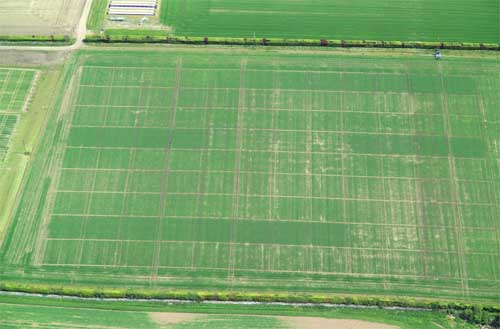Latest Briefing in Sustainability and Communities for 2010
Towards a low-nitrogen future
Efficient use of nitrogen (N) by plants is critical for maintaining future crop productivity as artificial fertilisers become more costly to produce. Global N fertiliser use for crop production has increased approximately seven-fold in the last 50 years, enabling crop production to keep pace with population growth. However, the economic and energy costs of high N inputs to arable systems are not considered sustainable.
Production of artificial N fertilisers is expensive, requiring conversion of N gas into inorganic N, which relies on fossil fuels. The cost of N fertilisers has more than doubled in recent years, and prices are likely to increase further as fossil fuel supplies become limited. In addition, uptake and use of N fertiliser in cropped systems can be inefficient.
Globally, it has been estimated that only one-third of the N fertiliser applied to cereal crops ends up in the harvested grain. The N in agricultural soils is a major source of greenhouse gases such as nitrous oxides, and N can also be lost through leaching of nitrates into water courses. There is an urgent need for alternative crop management strategies to allow sufficient food production for human populations without exhausting global resources.
A combined approach is required to reduce our reliance on artificial N fertilisers for crop production. The key questions are:
- What are the alternatives to chemically-synthesised N fertilisers? We need to consider alternative sources of N, including recycled farmyard and urban organic waste and green manures.
- Can existing crop varieties maintain yield and quality with less artificial fertiliser and/or alternative fertilisers? We need new crop genotypes that are more efficient in the use of inorganic and organic forms of applied nitrogen.

Figure 1: Compost and slurry trials at Mylnefield, SCRI, showing the enhanced early development of the barley crop when quality green compost is used.
Read morePublished on 21 December 2010 in Sustainability and Communities
Briefings in Sustainability and Communities for 2010
Stopping the benign microbes all around us becoming pathogenic to plants
Pathogens of plants and animals can be present on crop plants with no visible symptoms. New evidence from molecular detection methods is revealing that many microorganisms enter several different relationships with plants during their life cycles. Read more
Published on 1 December 2010 in Sustainability and Communities
Improving phosphorous supply in organic agriculture
Supply and availability of phosphorous (P) is one of the major limiting factors in organic production systems. Read more
Published on 23 November 2010 in Sustainability and Communities
The use of Vaccination and diagnostics to support the sustainable control of Ectoparasites
Sheep scab (caused by the sheep scab mite Psorptes ovis) is endemic in the UK and is one of the most important diseases for the sheep industry. Read more
Published on 25 October 2010 in Sustainability and Communities , Food, health and wellbeing
Future disease threats to food crops - are we prepared?
Monitoring crops for new threats provides an early warning of emerging problems affecting food production & quality. Read more
Published on 18 October 2010 in Sustainability and Communities , Climate, water and energy , Ecosystems and biodiversity
Plants and Plant Extracts to Replace Growth-Promoting Antibiotics in Farm Livestock Production
Antibiotics were used as growth promoters (GPA) in poultry, pig and ruminant livestock production for more than 40 years before their ban by the European Commission at the beginning of 2006. Read more
Published on 1 September 2010 in Sustainability and Communities , Food, health and wellbeing
Beef Cow Management in Scotland: A Sensitive Balancing Act
Management of beef suckler cow enterprises requires a difficult but vitally important balance between the need for farm profits, animal health and welfare and sustainable food production. Read more
Published on 30 August 2010 in Sustainability and Communities , Food, health and wellbeing
Comparing Scottish Farm-level Efficiencies with Other UK Countries
Published on 12 August 2010 in Sustainability and Communities
Molecular Epidemiology: Fingerprinting the culprit
Within even species of bacteria, parasite and virus there are can be several different strains; each are unique and capable of causing very different diseases in livestock and man. Read more
Published on 27 July 2010 in Sustainability and Communities , Ecosystems and biodiversity , Food, health and wellbeing
Potato Growers: Do You Know Your Enemy?
Understanding the late blight pathogen population helps potato growers manage disease . Read more
Published on 28 April 2010 in Sustainability and Communities
DNA Barcoding Of Liverworts - A Powerful Tool In Species Discovery
Trialling study at RBGE on barcoding different plant groups . Read more
Published on 27 April 2010 in Sustainability and Communities , Ecosystems and biodiversity







